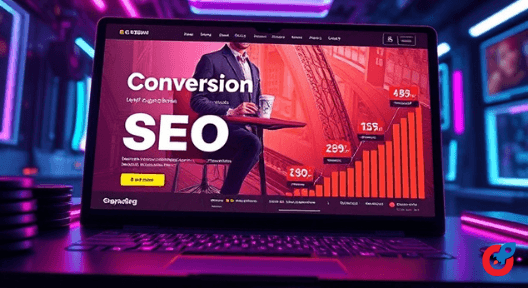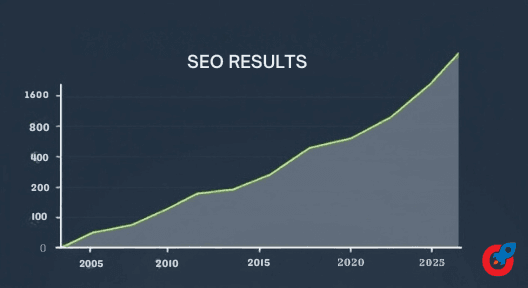SEO Power Play: Chapter 1.4 – SEO Fundamental
In the ever-evolving digital landscape, achieving online success isn’t simply about having a website or presence on social media. It’s about visibility, attracting the right audience, engaging them, and ultimately converting them into loyal customers. This is where SEO, or Search Engine Optimization, plays a vital role. SEO is not just a buzzword; it’s a critical component of any digital strategy that can help businesses rise above their competition, improve their online presence, and increase their bottom line.
Search Engine Optimization (SEO) is the process of optimizing your website so that it ranks higher in search engine results pages (SERPs). It involves various strategies and techniques aimed at improving the visibility of your website on search engines like Google, Bing, and Yahoo. When your website ranks higher for relevant search terms, it attracts more traffic, which increases your chances of achieving online success.
In this seventh article of our “SEO Power Play” series, we will discuss why SEO is indispensable for online success. We’ll explore how SEO can elevate your brand, increase organic traffic, enhance user experience, improve conversion rates, and drive long-term growth.
Table of Contents
What Is SEO and Why It’s Crucial for Online Success
At its core, SEO is the practice of making adjustments to your website’s content, structure, and authority to improve its ranking in search engine results. These adjustments help search engines understand the relevance and quality of your content, so they can match it with user queries. Higher rankings on search engines not only bring more organic traffic but also make your website more visible to potential customers.
SEO involves optimizing both the on-page (website content, structure) and off-page (backlinks, social signals) elements of your online presence. Additionally, technical SEO, which includes aspects like site speed, mobile optimization, and indexing, ensures that search engines can crawl and index your site effectively.
Achieving online success today demands more than just good content and engaging visuals—it requires a well-optimized website that appeals to both users and search engines. The benefits of SEO are far-reaching, and its impact on your online success is undeniable.
1. SEO Helps Increase Organic Traffic

One of the primary goals of SEO is to drive organic traffic to your website. Organic traffic is the traffic that comes to your site through unpaid search results. Unlike paid ads, organic traffic doesn’t require a financial investment, making it an incredibly cost-effective strategy for businesses aiming for online success.
According to data, organic search is responsible for more than 53% of all website traffic. When your website ranks higher for relevant keywords, the likelihood of users clicking on your page increases exponentially. People tend to trust organic search results more than paid advertisements, and as a result, organic traffic can lead to higher quality visitors.
But what makes organic traffic so valuable for online success?
- Sustainability: Unlike paid campaigns that stop once the budget runs out, SEO provides long-lasting results. When your website ranks high for certain keywords, it continues to attract organic visitors without requiring continuous investment.
- Higher Click-Through Rates (CTR): Websites that appear at the top of search results are more likely to get clicked on by users. In fact, the top three search results on Google receive over 50% of all clicks for a given query.
- Free and Cost-Effective: Unlike paid ads, organic traffic comes without the need for ongoing budget allocation. With proper SEO practices, you can continuously bring in new visitors without spending additional funds.
In short, online success heavily relies on consistent organic traffic that can be achieved through SEO. This kind of traffic is not just more cost-effective but also tends to bring visitors who are genuinely interested in your content or offerings.
2. SEO Enhances User Experience (UX)

Search engines like Google are designed to prioritize the best possible experience for their users. For this reason, Google’s algorithm evaluates user experience (UX) as a critical ranking factor. Websites that offer superior UX are more likely to rank higher on search engine results pages (SERPs), ultimately attracting more traffic and helping businesses achieve online success.
Here’s how SEO improves UX:
- Mobile Optimization: Google uses mobile-first indexing, meaning it evaluates the mobile version of a website before the desktop version. Since mobile traffic accounts for more than half of all web traffic globally, ensuring that your website is mobile-friendly is essential for both UX and SEO.
- Fast Loading Speeds: Page speed is a major ranking factor in Google’s algorithm. Websites that load slowly tend to have higher bounce rates, which negatively impacts rankings. By optimizing site speed, you enhance the user experience and ensure that users are more likely to stay on your site, reducing the bounce rate and increasing engagement.
- Easy Navigation: SEO practices encourage creating a clear, logical website structure that helps visitors easily find the information they need. Simple navigation increases the chances of users exploring more pages on your website, resulting in longer sessions, more interactions, and better conversion opportunities.
When visitors enjoy a positive user experience, they are more likely to stay on your site, revisit in the future, and recommend it to others. This increased engagement contributes significantly to online success by fostering customer loyalty and trust.
3. SEO Increases Brand Visibility and Credibility

SEO isn’t just about attracting traffic; it’s also about visibility and trust. Brands that rank on the first page of Google are perceived as more credible by users. According to studies, nearly 75% of users never scroll past the first page of search results. If your website ranks higher, it boosts your credibility and increases your chances of getting clicked.
Brand visibility is critical for online success, and SEO can help you achieve it by:
- Higher Rankings: As your website ranks higher for more relevant keywords, your brand is exposed to more people. More visibility means more clicks, which translates to higher traffic and more conversions.
- Building Trust and Authority: Appearing on the first page of Google makes your brand appear more trustworthy and authoritative. Users tend to believe that search engines only show the most relevant and credible results, which means that ranking highly can improve your reputation in the eyes of your audience.
- Increasing Click-Through Rate (CTR): The higher your website ranks for target keywords, the more likely users are to click on your link. This creates an organic increase in CTR, which is another signal to Google that your website is relevant and authoritative, helping to boost rankings even further.
For online success, visibility and credibility are non-negotiable. A strong SEO strategy ensures that your brand gets the attention it deserves, making it easier for potential customers to find you and trust your business.
4. SEO Drives Higher Conversion Rates

Driving traffic to your website is essential, but it’s not enough if that traffic doesn’t convert. One of the most significant benefits of SEO is that it helps you attract high-quality, targeted traffic that’s more likely to convert into leads, sales, or other desired actions.
SEO drives targeted traffic by focusing on keywords that align with the user’s search intent. When a user searches for a specific term, and your website ranks for that term, you’re more likely to connect with individuals who are already interested in what you offer.
Here’s why SEO leads to higher conversion rates:
- Relevance: SEO ensures that the traffic you attract is highly relevant to your business. People searching for terms related to your products or services are more likely to convert into paying customers than those who stumble upon your website through random sources.
- Improved Engagement: By providing high-quality content that meets user needs, SEO improves engagement on your website. Engaged users are more likely to interact with your content, complete forms, make purchases, or take other actions that lead to conversions.
- Optimized Landing Pages: SEO involves optimizing landing pages for the best user experience and relevant keywords. This optimization improves the chances of visitors staying on your website and taking the actions you desire, whether that’s purchasing a product, signing up for a newsletter, or requesting more information.
The connection between SEO and conversion rates is clear. The better optimized your website is for SEO, the more likely you are to convert traffic into tangible results. This directly impacts online success by driving sales, leads, and engagement, which are critical to growing your business.
5. SEO Provides Long-Term Results

One of the greatest advantages of SEO over other marketing methods is its ability to provide long-term, sustainable results. While pay-per-click (PPC) ads and social media campaigns can provide quick bursts of traffic, once you stop investing in those areas, the traffic stops.
With SEO, the work you put into optimizing your website continues to pay dividends long after the initial investment. When you consistently create high-quality content, build backlinks, and optimize your website’s structure, your rankings improve over time. This continued improvement helps maintain high levels of organic traffic without needing ongoing investments in ads.
For online success, long-term sustainability is key. SEO builds a solid foundation that allows you to reap the benefits for years. Once you achieve high rankings, maintaining them is less costly and more effective than other marketing methods.
6. SEO Offers Better Data and Insights

SEO doesn’t just help drive traffic—it also provides valuable data and insights about your audience, website performance, and content strategy. Tools like Google Analytics and Google Search Console offer a wealth of information that
helps you make informed decisions.
With SEO, you can:
- Track user behavior: See where visitors are coming from, what pages they visit, and how long they stay on your site.
- Identify high-performing keywords: Discover which keywords are driving the most traffic to your site, allowing you to focus on the most valuable terms for online success.
- Measure conversion rates: See how well your website is converting visitors into customers, allowing you to optimize your site for better conversion rates.
With this data, you can make informed decisions that enhance your SEO strategy, ultimately leading to better performance and online success.
7. SEO Helps Build Brand Authority and Reputation

Another significant benefit of SEO is how it contributes to building brand authority and reputation. When your website ranks highly for relevant keywords, it signals to both search engines and users that your website is a trusted source of information or services. This is particularly crucial in competitive industries where trust and authority can make or break a business’s online success.
Here are several ways SEO helps build your brand’s authority:
- Content Marketing and Thought Leadership: SEO and content marketing go hand in hand. By creating informative, valuable, and well-researched content that addresses users’ queries, you position your brand as an authority in your industry. Blogging, publishing research reports, creating video tutorials, and offering expert opinions can all contribute to building credibility. Search engines reward authoritative content with higher rankings, which in turn increases the trust your audience places in your brand.
- Backlinks from Reputable Sites: A key factor in SEO is acquiring backlinks from high-authority websites. Backlinks act as “votes of confidence” in your content. When reputable sites link to your pages, it signals to search engines that your content is valuable and trustworthy. This improves your domain authority, which boosts your SEO rankings, driving even more traffic and contributing to your overall online success.
- Brand Consistency Across Channels: SEO also ensures that your brand’s name, logo, and messaging are consistent across various online platforms. Whether it’s through social media, guest blogging, or listings in online directories, maintaining consistent branding across all channels builds your reputation and recognition, making it easier for potential customers to find and trust you. This consistency creates a stronger online presence that translates into online success.
- Customer Reviews and Testimonials: User-generated content such as reviews, ratings, and testimonials not only influences local SEO but also plays a crucial role in building your brand’s reputation. Positive reviews on sites like Google My Business, Yelp, or Trustpilot can act as social proof, influencing potential customers to trust your business. For businesses aiming for online success, encouraging customers to leave feedback can have a profound impact on brand authority and trustworthiness.
By implementing a robust SEO strategy that prioritizes content quality, backlinks, and reputation management, businesses can enhance their brand’s authority and reputation. This can directly influence online success by attracting loyal customers, encouraging repeat business, and elevating your presence within your industry.
8. SEO Facilitates Better Collaboration Between Marketing and IT Teams

SEO often requires the collaboration of multiple teams within an organization, including marketing, IT, and content teams. This collaboration is key to maximizing the impact of SEO on online success. While marketing teams focus on content creation, keyword strategy, and analytics, the IT team plays a crucial role in optimizing the technical aspects of the website, such as site speed, security, and mobile responsiveness. Without this cooperation, your SEO efforts may be hampered.
Here are some ways better collaboration between teams can drive online success:
- Efficient Website Optimization: The IT team ensures that the website is structured and coded properly, allowing search engines to crawl and index it effectively. For example, ensuring that the website has clean, organized HTML code, implementing a clear URL structure, and using Schema Markup for rich snippets can help search engines understand the content of the page. When the marketing and IT teams work together, these technical elements are optimized, giving the website the best chance of ranking well on search engine results pages.
- Improved Mobile Experience: As more users browse the internet on mobile devices, it is essential that websites are optimized for mobile. SEO encourages both marketing and IT teams to focus on mobile responsiveness, ensuring that pages load quickly and content displays correctly on smartphones and tablets. This is crucial for online success, as search engines like Google prioritize mobile-friendly websites.
- Faster Site Speed: Website speed is a key ranking factor. Slow-loading websites not only frustrate users but also suffer from higher bounce rates. When the IT and marketing teams collaborate on improving page load times through optimization techniques like image compression, caching, and efficient server use, SEO performance improves. Faster websites lead to better user experiences, reduced bounce rates, and higher conversion rates—all contributing to online success.
SEO requires a blend of creative and technical efforts, and when marketing and IT teams work together, they can ensure that all aspects of SEO are covered. This collaboration accelerates growth and helps businesses achieve sustainable online success.
9. SEO Improves Long-Term Return on Investment (ROI)

While many marketing tactics require ongoing investment, SEO offers an excellent return on investment (ROI) over the long term. By investing time and resources into SEO today, you can reap the benefits for months or even years to come. Unlike paid advertising, which stops generating results as soon as the campaign ends, SEO provides lasting organic traffic that continues to grow with time, improving your chances of online success.
Here’s why SEO offers a superior ROI:
- Long-Term Traffic Gains: As you build up your website’s authority and rankings over time, your traffic continues to increase. Once you rank for high-traffic keywords, you can enjoy a steady stream of visitors without having to pay for each click or impression.
- Higher Conversion Rates: Since SEO helps you attract highly relevant traffic, users who arrive on your website are more likely to convert. These visitors are already searching for the products or services you offer, so they are more inclined to make a purchase, sign up for a newsletter, or take another desired action.
- Cost-Effectiveness: Compared to other digital marketing strategies, SEO can be more cost-effective. Paid advertising campaigns can require substantial budgets, and their effects are temporary. SEO, on the other hand, is an investment that pays off long-term. The more you invest in SEO today, the more you’ll benefit in the future, making it a smart strategy for achieving online success with a high ROI.
- Increased Brand Visibility and Recognition: SEO doesn’t just bring more traffic to your website; it also builds awareness for your brand. When you consistently appear on the first page of search results for relevant queries, your brand becomes more recognizable to your target audience. Over time, this can result in increased trust and more business opportunities, driving sustained online success.
SEO’s ability to generate long-term, cost-effective results makes it an ideal strategy for businesses looking to achieve online success and see a strong ROI from their marketing efforts.
10. SEO Enables Data-Driven Decision Making

One of the key advantages of SEO is that it provides a wealth of data that businesses can use to make informed decisions. By analyzing data from tools like Google Analytics, Google Search Console, and keyword tracking software, you can gain valuable insights into your audience, website performance, and SEO effectiveness. This data helps you understand which strategies are working and which areas need improvement, ensuring that your efforts are aligned with achieving online success.
Here’s how data-driven decision-making improves your SEO outcomes:
- Keyword Performance: SEO tools provide detailed information about how specific keywords are performing. You can track rankings, search volume, click-through rates, and competition levels to determine which keywords are most valuable for your business. This data allows you to refine your keyword strategy and focus on high-performing terms that bring the most traffic.
- User Behavior: By analyzing user behavior on your website, such as time on page, bounce rate, and conversion rates, you can identify which pages are engaging visitors and which ones need improvement. For example, if users are leaving a specific page quickly, it might indicate that the content isn’t addressing their needs. By making changes based on these insights, you can improve the user experience and increase the chances of converting visitors into customers, which drives online success.
- Competitor Analysis: SEO tools also allow you to track your competitors’ performance. By analyzing their rankings, backlinks, and content strategies, you can identify opportunities to outperform them in search results. This competitive intelligence helps you stay ahead of the curve and continually improve your SEO efforts to achieve online success.
- Tracking ROI: By setting up goals in tools like Google Analytics, you can track conversions and measure the ROI of your SEO efforts. Whether it’s a sale, lead generation, or another desired action, tracking your SEO ROI ensures that your efforts are paying off and contributing to online success.
By leveraging SEO data, you can make continuous improvements to your website and strategy, ensuring long-term growth and sustained online success.
References
- Search Engine Journal. (2021). The Importance of SEO for Business Growth. Link
- Backlinko. (2020). Google CTR Study: How Position Affects Click-Through Rate. Link
- HubSpot. (2022). The Ultimate Guide to SEO for Beginners. Link
- Google Search Central. (2021). Mobile-First Indexing. Link
- Moz. (2020). Beginner’s Guide to SEO. Link
Conclusion: SEO is the Backbone of Online Success
SEO is not just an optional marketing tactic; it is the backbone of online success. From driving organic traffic and improving user experience to building brand authority and delivering a solid ROI, SEO is essential for businesses looking to thrive in the digital world. A well-executed SEO strategy provides both immediate and long-term benefits, ensuring that your website ranks higher, attracts more visitors, and converts those visitors into customers.
Whether you’re a small business or a large enterprise, embracing SEO will help you establish a strong online presence, gain credibility, and drive sustainable growth. In an era where online visibility is critical, SEO is the key to achieving lasting online success. Invest in SEO today, and watch your business thrive in the competitive digital landscape.

